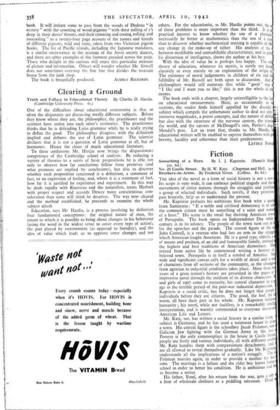Clearing a Ground
Truth and Fallacy in Educational Theory. By Charles D. Hardie. (Cambridge University Press. 6s.)
ONE of the difficulties about educational controversy is that so often the disputants are discussing totally different subjects. Before they know where they are, the philosopher, the practitioner and the scientist have stolen into each other's territories. The practitioner thinks that he is defending Latin grammar while he is really trying to define the good. The philosopher disagrees with the definition implied and debates the use of Latin grammar. The scientist declares that it is not a question of Latin grammar at all, but of hormones. Hence the chaos of much educational literature.
To these confusions Mr. Hardie now brings the dispassionate competence of the Cambridge school of analysis. By reducing a variety of theories to a series of basic propositions he is able not only to observe how far conclusions follow from premises (and what premises are implied by conclusions), but also to discover whether each proposition concerned is a definition, a statement of fact, or an expression of feeling, and, where it is a statement of fact, how far it is justified by experience and experiment. In this way he deals rapidly with Rousseau and the naturalists, treats Herbart with proper respect and accords Dewey more conscientious con- sideration than some will think he deserves. The way now cleared and the method established, he proceeds to examine the whole subject afresh Education, says Mr Hardie, is a process involving by definition four fundamental conceptions: the original nature of man, the extent to which it is possible to bring about changes in his behaviour (using the word in the widest sense to cover every type of action), the part played by environment (as opposed to heredity), and the idea of value which leads us to approve some changes and not
others. For the educationist, as Mr. Hardie points out, the of these problems is more important than the third. It is of practical interest to know whether the son of a physicist necessarily be better at mathematics than the son of a ski than to discover whether -mathematical training is capable of e any change in the make-up of either. His analysis of the between modifiable and unmodifiable characteristics, and in pair, his discussion of intelligence, shows the author at his best.
With the idea of value he- is perhaps less happy. The re theory of education, whatever its merits, is surely not based elusively or even mainly on an explanation of the origin of The existence of moral judgements in children of six and th fallibility of Mr. Russell are both open to discussion. And philosophers would still maintain that while " good " may "I like and I want you to like," this is not the whole of means.
The book ends with a chapter, largely unintelligible to the la; on educational measurement. Here, as occasionally in sections, the reader finds himself appalled by the disorder subject which, compels the unfortunate author to deal not only intensive magnitudes, a priori concepts, and the nature of defini but also with the structure of the nervous system, the crea the world, and the careers of McDougall's rats, Pavlov's dogs Menders peas. Let us trust that, thanks to Mr. Hardie, f educational writers will be enabled to express themselves with gr brevity, lucidity and coherence than their predecessors.
LETTICE Fo


























 Previous page
Previous page